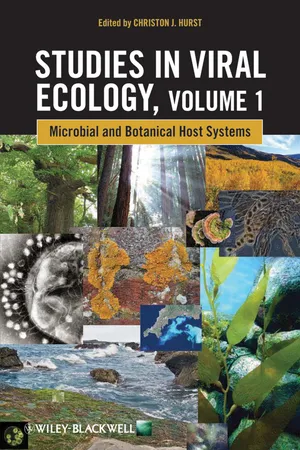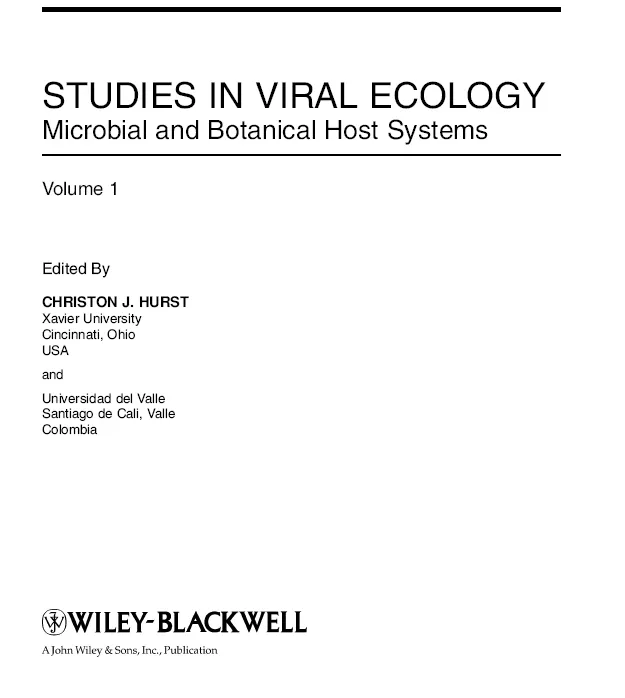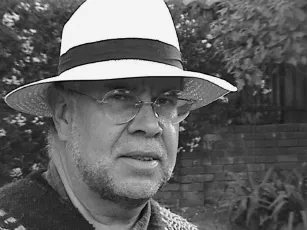
eBook - ePub
Studies in Viral Ecology, Volume 1
Microbial and Botanical Host Systems
- English
- ePUB (mobile friendly)
- Available on iOS & Android
eBook - ePub
About this book
This book explains the ecology of viruses by examining their interactive dynamics with their hosting species (in this volume, in microbes and plants), including the types of transmission cycles that viruses have evolved encompassing principal and alternate hosts, vehicles, and vectoring species. Examining virology from an organismal biology approach and focusing on the concept that viral infections represent areas of overlap in the ecologies of the involved species, Viral Ecology is essential for students and professionals who either may be non-virologists or virologists whose previous familiarity has been very specialized.
Tools to learn more effectively

Saving Books

Keyword Search

Annotating Text

Listen to it instead
Information

Copyright © 2011 by Wiley-Blackwell. All rights reserved
Published by John Wiley & Sons, Inc., Hoboken, New Jersey
Published simultaneously in Canada
No part of this publication may be reproduced, stored in a retrieval system, or transmitted in any form or by any means, electronic, mechanical, photocopying, recording, scanning, or otherwise, except as permitted under Section 107 or 108 of the 1976 United States Copyright Act, without either the prior written permission of the Publisher, or authorization through payment of the appropriate per-copy fee to the Copyright Clearance Center, Inc., 222 Rosewood Drive, Danvers, MA 01923, (978) 750-8400, fax (978) 750-4470, or on the web at www.copyright.com. Requests to the Publisher for
permission should be addressed to the Permissions Department, John Wiley & Sons, Inc., 111 River Street, Hoboken, NJ 07030, (201) 748-6011, fax (201) 748-6008, or online at www.wiley.com/go/permission.
Limit of Liability/Disclaimer of Warranty: While the publisher and author have used their best efforts in preparing this book, they make no representations or warranties with respect to the accuracy or completeness of the contents of this book and specifically disclaim any implied warranties of merchantability or fitness for a particular purpose. No warranty may be created or extended by sales representatives or written sales materials. The advice and strategies contained herein may not be suitable for your situation. You should consult with a professional where appropriate. Neither the publisher nor author shall be liable for any loss of profit or any other commercial damages, including but not limited to special, incidental, consequential, or other damages.
For general information on our other products and services or for technical support, please contact our Customer Care Department within the United States at (800) 762-2974, outside the United States at (317) 572-3993 or fax (317) 572-4002.
Wiley also publishes its books in a variety of electronic formats. Some content that appears in print may not be available in electronic formats. For more information about Wiley products, visit our web site at www.wiley.com.
Library of Congress Cataloging-in-Publication Data:
Studies in viral ecology / edited by Christon J. Hurst.
v. cm.
Includes index.
Contents: v.1. Microbial and Botanical Host Systems (ISBN 978-0-470-62396-1)
– v.2. Animal Host Systems (ISBN 978-0-470-62429-6).
ISBN (set) 978-1-118-02458-4 (cloth)
1. Viruses–Ecology. I. Hurst, Christon J.
QR478.A1S78 2011
579.2–dc22
2010046370
oBook ISBN: 978-1-118-02566-6
ePDF ISBN: 978-1-118-02564-2
ePub ISBN: 978-1-118-02565-9
Dedication
I dedicate these two volumes to the memory of my brother in spirit, Henry Hanssen. To me, he seemed a hero and I remember him most for his unfailing ability to present a sense of humanity in times of tragedy. We first met while studying together for our doctorates in Houston, Texas.
Henry was born in Colombia near Medellín and tragically orphaned as a young child after which he was lovingly raised by an aunt in Bogotá. Henry may have gained his tremendous sense of humanity from that experience. He had no biological children of his own but helped to raise two daughters. The first of those came into his life by a twist of luck while one day Henry was walking along a street in Colombia and heard what he thought might be a cat trapped inside of a garbage bin. Henry went over to free the cat and discovered instead a crying infant child in a plastic bag, presumably discarded there by a distraught mother. Henry took the baby to the police, and when no one stepped forward as a parent Henry adopted the child and eventually even helped to pay for her college tuition. The second daughter came through Henry's marriage to the love of his life.
When there arose need for representing humanity, Henry was undaunted by circumstance. His accomplishments included establishing an infant vaccination program against poliomyelitis in Angola at the personal request of Jonas Salk. Angola was in a state of civil war at that time and no one else was willing to undertake the necessary but frightening task. Henry showed equal humanitarianism to civilians and military on both sides of that conflict. Subsequently, Henry initiated a similar poliomyelitis vaccination program during a period of civil war in Central America and for his efforts was awarded honorary citizenship by one of the countries there. He then initiated a poliomyelitis vaccination program in his native Colombia, while that country's continuing civil war was in full strength.
I was proud to address Henry by the name of “brother” and always will think of him in that way. He addressed me by that same term of affection and he is lovingly remembered by everyone whom his life touched.
Henry Hanssen Villamizar (1945–2007)

Preface
Virology is a field of study which has grown and expanded greatly since the viruses as a group first received their name in 1898. Many of the people who presently are learning virology have come to perceive these acellular biological entities as being merely trinkets of nucleic acid to be cloned, probed, and spliced. However, the viruses are much more than merely trinkets to be played with in molecular biology laboratories. The viruses are indeed highly evolved biological entities with an organismal biology that is complex and interwoven with the biology of their hosting species. Ecology is defined as the branch of science which addresses the relationships between an organism of interest and the other organisms with which it interacts, the interactions between the organism of interest and its environment, and the geographical distribution of the organism of interest.
The purpose of this book is to help define and explain the ecology of viruses, i.e., to examine what life might seem like from a “virocentric” point of view, as opposed to our normal “anthropocentric” perspective. As we begin our examination of the virocentric life, it is important to realize that in nature both the viruses of macroorganisms and the viruses of microorganisms exist in cycles with their respective hosts. Under normal conditions, the impact of viruses upon their natural host populations may be barely apparent due to factors such as evolutionary coadaptation between the virus and those natural hosts. However, when viruses find access to new types of hosts and alternate transmission cycles, or when they encounter a concentrated population of susceptible genetically similar hosts such as occurs in densely populated human communities, communities of cultivated plants or animals, or algal blooms, then the impact of the virus upon its host population can appear catastrophic. The key to understanding these types of cycles lies in understanding the viruses and how their ecology relates to the ecology of their hosts, their alternate hosts, and any vectors which they utilize, as well as their relationship to the availability of suitable vehicles that can transport the different viral groups.
I hope that you will enjoy the information presented in this book set as much as I and the other authors have enjoyed presenting it to you. The written word is a marvelous thing, able to convey understanding and enthusiasm across unimaginable distances and through time.
Christon J. Hurstbr
Cincinnati, Ohio
Cincinnati, Ohio
Contributors
Michael J. Allen, Plymouth Marine Laboratory, Plymouth, United Kingdom
Francesco Di Serio, Istituto di Virologia Vegetale (CNR), Bari, Italy
Nuria Duran-Vila, Instituto Valenciano de Investigaciones Agrarias (IVIA), Moncada, Spain
Claude M. Fauquet, ILTAB/Danforth Plant Science Center, St. Louis, MO
Ricardo Flores, Instituto de Biología Molecular y Celular de Plantas (UPV-CSIC), Valencia, Spain
Bradley I. Hillman, Department of Plant Biology and Pathology, Rutgers University, New Brunswick, NJ
Christon J. Hurst, Departments of Biology and Music, Xavier University, Cincinnati, OH; Engineering Faculty, Universidad del Valle, Ciudad Universitaria Meléndez, Santiago de Cali, Valle, Colombia
William Kress, Delaware Biotechnology Institute, University of Delaware, Newark, DE
Lauren D. McDaniel, USF College of Marine Science, University of South Florida, St. Petersburg, FL
Michael G. Milgroom, Department of Plant Pathology and Plant-Microbe Biology, Cornell University, Ithaca, NY
Beatriz Navarro, Istituto di Virologia Vegetale (CNR), Bari, Italy
Debi P. Nayak, David Geffen School of Medicine at UCLA, Los Angeles, CA
Robert A. Owens, Beltsville Agricultural Research Center (USDA), Beltsville, MD
Basavaprabhu L. Patil, ILTAB/Danforth Plant Science Center, St. Louis, MO
Eric Sakowski, Delaware Biotechnology Institute, University of Delaware, Newark, DE
Declan C. Schroeder, Marine Biological Association of the UK, Plymouth, United Kingdom
Reed B. Wickner, Laboratory of Biochemist...
Table of contents
- Cover
- Volume 1
- Copyright
- Dedication
- Preface
- Contributors
- Attribution Credits for Cover and Spine Artwork
- Section I: An Introduction to the Structure and Behavior of Viruses
- Section II: Viruses of Other Microorganisms
- Section III: Viruses of Macroscopic Plants
- Color Plates
- Index
Frequently asked questions
Yes, you can cancel anytime from the Subscription tab in your account settings on the Perlego website. Your subscription will stay active until the end of your current billing period. Learn how to cancel your subscription
No, books cannot be downloaded as external files, such as PDFs, for use outside of Perlego. However, you can download books within the Perlego app for offline reading on mobile or tablet. Learn how to download books offline
Perlego offers two plans: Essential and Complete
- Essential is ideal for learners and professionals who enjoy exploring a wide range of subjects. Access the Essential Library with 800,000+ trusted titles and best-sellers across business, personal growth, and the humanities. Includes unlimited reading time and Standard Read Aloud voice.
- Complete: Perfect for advanced learners and researchers needing full, unrestricted access. Unlock 1.4M+ books across hundreds of subjects, including academic and specialized titles. The Complete Plan also includes advanced features like Premium Read Aloud and Research Assistant.
We are an online textbook subscription service, where you can get access to an entire online library for less than the price of a single book per month. With over 1 million books across 990+ topics, we’ve got you covered! Learn about our mission
Look out for the read-aloud symbol on your next book to see if you can listen to it. The read-aloud tool reads text aloud for you, highlighting the text as it is being read. You can pause it, speed it up and slow it down. Learn more about Read Aloud
Yes! You can use the Perlego app on both iOS and Android devices to read anytime, anywhere — even offline. Perfect for commutes or when you’re on the go.
Please note we cannot support devices running on iOS 13 and Android 7 or earlier. Learn more about using the app
Please note we cannot support devices running on iOS 13 and Android 7 or earlier. Learn more about using the app
Yes, you can access Studies in Viral Ecology, Volume 1 by Christon J. Hurst in PDF and/or ePUB format, as well as other popular books in Biological Sciences & Microbiology. We have over one million books available in our catalogue for you to explore.